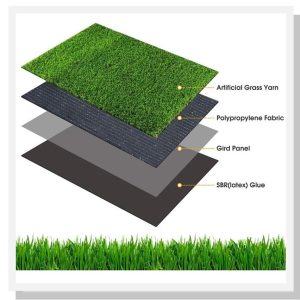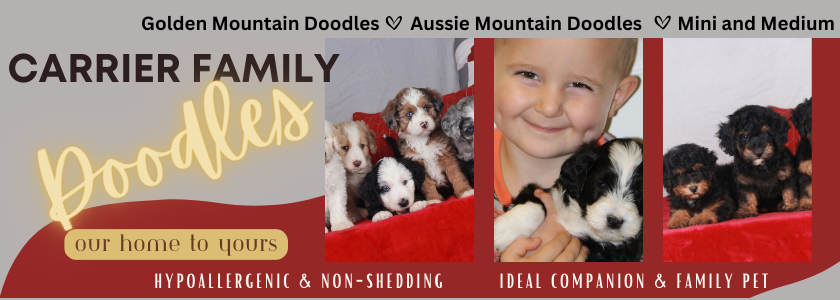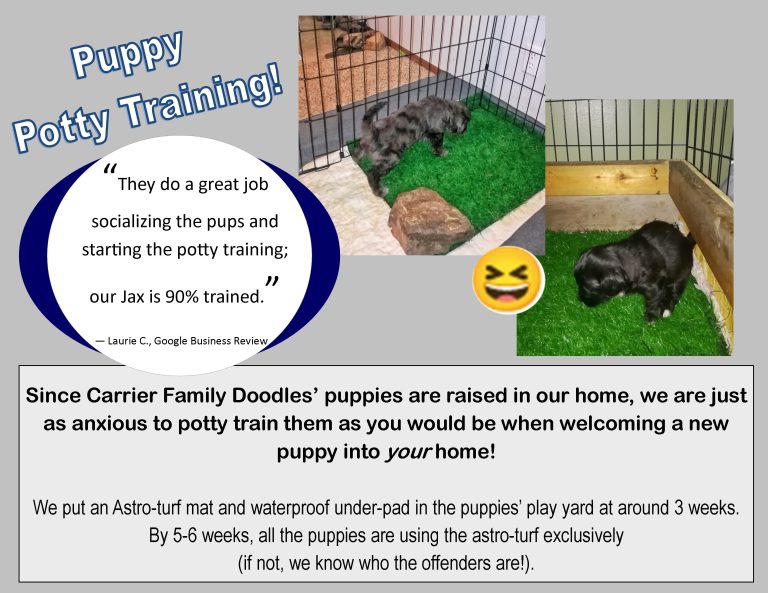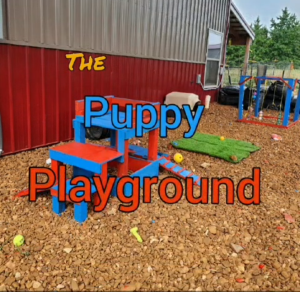
We take puppy potty training seriously. Our Astro-turf potty system helps our puppies go home "almost potty trained!"
Our puppy potty training "philosophy" may be different from what you see with other breeders. Here's why...
At Carrier Family Doodles, we are very careful about outdoor exposure, to prevent our puppies from picking up parasites like Giardia and coccidia that are common in the environment. Older dogs with strong immune systems are generally unaffected, but a puppy still developing has a more difficult time.
Giardia is a particularly tenacious parasite; it can require both lengthy and repeated treatments. While diarrhea is the most common symptom and can be “manageable,” chronic giardia can lead to malabsorption issues and a less-than-healthy puppy.[i] So you can see why we take every precaution against this for our puppies.
Of course, we don’t want our puppies to experience these potentially harmful digestive issues. As well, we prefer not to have to treat a sensitive system with harsh medications early on. We made a decision to reduce the risks by keeping our puppies primarily indoors for as long as they are with us. They do not share outdoor areas with our adult dogs.
Sometimes Mama or a puppy caregiver can inadvertently bring something in on their feet, but we also know the signs of gastrointestinal infection in puppies, so we test and treat accordingly when we have to. Thankfully, it is rare.
By the time the puppies are 7-8 weeks old, their immune systems are much more strongly established and they have gotten their first dose of the 5-way vaccine. Every puppy is, therefore, given a 5-day preventative treatment for parasites just before leaving us, to ensure good health and to make sure nothing adverse will be introduced into his/her new, “forever home.” (This is especially important for puppies going into a home where there is already another dog.)
Even though we do not introduce our puppies to the great outdoors, most of our puppy customers report that our puppies are “90-95% potty trained” when they go home. How do we do it?
Our potty training process
Puppies typically open their eyes at around two weeks of age and start to (somewhat awkwardly) explore their whelping box by three weeks . At that time, we leave a comfy blanket in the box, where they typically sleep & nurse with their Mama. We surround the blanket with astro-turf mats and waterproof under pads.
Because puppies are in the habit of going potty once they wake up from a nap (and they don’t want to go potty where they sleep), they quickly associate the blanket with sleeping and the astro-turf with going potty. Since they aren’t very active at such a young age, they mostly sleep and play on the blanket and use the astro-turf for elimination.
Once they get a little more active at 4+ weeks, we remove all but one astro-turf mat. We place their sleeping area at one end of their large, gated, puppy area and the astro-turf goes on the opposite side. The puppies enjoy a large play area in the middle. It’s a perfect set-up!
Weather permitting, our puppies also spend time in our protected, outdoor puppy playground. It is covered with rounded stone that is regularly bleached to keep it as sanitary as possible. Whether indoors or outdoors, our puppies are trained to an astro-turf potty system, which closely approximates grass and translates well to going outdoors after their adoption.
The puppies acclimate very well to the use of the astro-turf. If some are not “getting it,” we use a training spray that is designed to attract the puppies to urinate in a particular spot.
For some reason, our mini puppies acclimate very quickly, while the medium-sized puppies are a little slower to catch on. By the time they leave us, however, almost all of our puppies are fully astro-turf trained. Any “offenders” are known, and their future owners are warned to be vigilant!
Potty training for the New Puppy Owner
Your puppy will hopefully be relatively easily potty trained with consistency and encouragement. Don’t over-react to puppy accidents; just clean them up. Your puppy will mostly learn by being encouraged/rewarded when they go when and where you want them to! On the other hand, punishing may invoke fear. Our puppies are well-socialized and have a natural tendency to want to please; use this to your advantage in potty training by giving them lots of positive attention for desired behaviors.
Your puppy will need to go outside right away upon waking, and when young will probably “go” wherever their feet first hit the floor! We recommend carrying your puppy outside first thing, until they acclimate to going outside, know to expect it, and have good bladder control. Also, a young puppy may not yet be able to sleep through the night. You may want to get up at least once to let them outside if they’re not able to hold it till morning.
Puppy should eat three times per day and should go outside within about 20 minutes after eating. Take food away after this feeding period. However, puppy should have access to clean drinking water on-demand, so frequent urination needs to be anticipated. Take them outside for a “try” at potty at least every 2 hours, maybe every 1-1/2. Also watch for cues like sniffing/circling and take them out at other times as needed until they establish better bladder control and/or and let you know when they need to go out.
Some puppies will naturally whine or bark when they want to go outside. If not, you may have success with “bell training.” Hang loose jingle bells at puppy level and have them nose or paw every time before going out. Eventually they will learn to do this independently as a cue. Others opt for a dog door. Of course you will do what works best in your situation.


